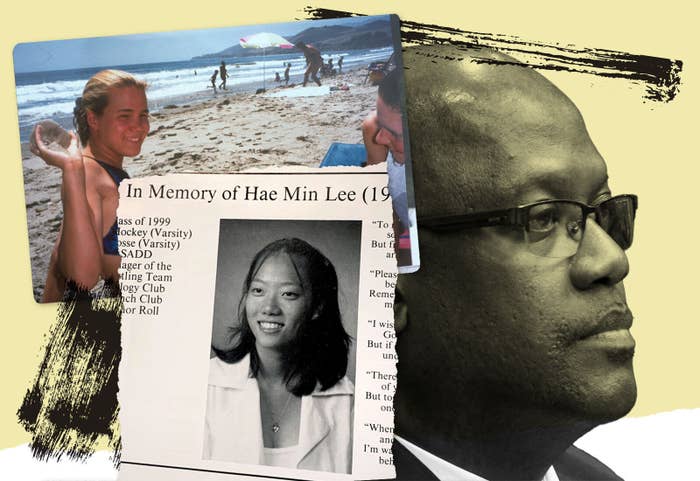
True crime receives a fair amount of criticism for turning real-life tragedies into entertainment, but the genre has an undeniable power to effect change. Just within the past few months, three podcasts were credited with remarkable outcomes in the cases they spotlighted.
Read on for more about these and other true crime podcasts that changed the course of an investigation.

Serial
“This is a Global-Tel link prepaid call from” — “Adnan Syed” — “an inmate at a Maryland correctional facility. This call will be recorded and monitored. If you wish to…”
I don’t know about you, but just hearing this automated message from the opening of Serial — overlaid by those first four piano notes of the theme music — takes me back to the first time I heard the podcast in October 2014. For the next two months, millions of us listened every Thursday (except for that maddening Thanksgiving break, which we took advantage of to indoctrinate our families over the holiday) as Sarah Koenig dissected the myriad inconsistencies in the case against Syed, convicted of killing his ex-girlfriend Hae Min Lee in 1999.
For those of us looking for closure in the then-final episode, we didn’t get it.
“If you ask me to swear that Adnan Syed is innocent, I couldn’t do it,” Koenig says in Episode 12’s last moments. “I nurse doubt. I don’t like that I do, but I do. I mean most of the time I think he didn’t do it. … As much as I want to be sure, I am not.”
As it turns out, that would not be Serial’s last episode. In September, a judge tossed out Syed’s sentence and set him free on home detention. On Oct. 11, hours after the charges were dropped against him, Serial dropped its actual finale. This time, Koenig chose not to share her personal opinion about whether Syed really killed Lee and instead focused on the many failures in his prosecution and the criminal justice system itself.
“The picture that’s emerged is this: Adnan’s case contains just about every chronic problem our system can cough up,” she said. “So even on a day when the government publicly recognizes its own mistakes, it’s hard to feel cheered about a system that takes 20 years to self-correct. And that’s just this one case.”
Your Own Backyard
In the first episode of Your Own Backyard in September 2019, Chris Lambert, who was born and raised in central California, said that he was in second grade when 19-year-old California Polytechnic State University student Kristin Smart disappeared on campus in May 1996. He’d grown up passing a billboard offering a $75,000 reward for information about her disappearance — a reward that was never claimed as the case remained unsolved. That is, until Lambert started his podcast.
In Your Own Backyard, Lambert brought attention to the decades-old case, interviewing key witnesses, uncovering new details, and ultimately providing almost irrefutable evidence that Paul Flores, long a person of interest, killed Smart. In fact, police arrested Flores in April 2021, just over a year and a half and millions of downloads after YOB debuted. He was found guilty last month of murdering Smart and faces 25 years to life in prison when he is sentenced on Dec. 9.
After the trial, San Luis Obispo County District Attorney Dan Dow thanked Lambert for devoting "countless hours" to the case, saying, "His podcast helped to identify additional new witnesses in the collection of important evidence that was critical in the prosecution of this case.” In a news release, Dow added, “We acknowledge the tireless efforts of Chris Lambert in persistently and compassionately keeping the memory of Kristin alive, through the podcast Your Own Backyard.”
In an inspiring speech before the San Luis Obispo Chamber of Commerce in 2020, Lambert said, “A lot of people dropped the ball on this over the years: Cal Poly, the San Luis Obispo Sheriff’s Department, [and] even citizens who knew a little piece of the puzzle but were too afraid to come forward because they didn’t want to get wrapped up in something like that. I tried to remedy that.” (I urge you to watch this — it’s only six minutes long and you might find yourself standing up and applauding like everyone else in that audience.)
The Teacher’s Pet
Like Your Own Backyard, Australian investigative journalist Hedley Thomas highlighted a case involving a missing woman who was believed to be murdered, though no body was ever found. Also like YOB, police had a strong suspect who went years without being charged. The Teacher’s Pet, highlighting the 1982 disappearance of Lynette Dawson and the suspicions around her husband, Chris Dawson, was released in 2018 and was downloaded more than 60 million times around the world. Dawson was arrested four months after the podcast concluded its initial run.
The podcast was so influential that the Australian, the news outlet behind its production, took it down in the country over fears that it would unfairly influence potential jurors and witnesses.
Among the things the podcast highlighted: that Chris Dawson, a former pro rugby player turned PE teacher, groomed his 16-year-old student Joanne Curtis, hired her as a “babysitter” for his and Lyn’s two daughters, moved her into the home (and his bed) two days after Lyn disappeared, and gave her Lyn’s own engagement ring and wedding band before marrying her when she was 18; that Lyn disappeared without taking any of her belongings or contacting anyone, including her two young daughters, even though she had plans to meet her mother the next day; that Lyn had no resources to support herself financially; that Chris waited six weeks to report his wife missing; and that both Lyn and his second wife told others he had assaulted them.
Even without a body or direct evidence, the judge said when announcing the guilty verdict, “the only rational inference that the circumstances enable me to draw” is that Chris killed Lyn.
In the Dark, Season 2
The second season of In the Dark exposed one of the most aggressive and questionable prosecutions since the Central Park Five: Curtis Flowers, a Black man from Mississippi, was tried six times by District Attorney Doug Evans for the 1996 murders of four workers at the Tardy Furniture Company. Flowers spent 23 years behind bars, much of it on death row.
There are significant parallels to the reasons a judge cited for tossing out Adnan Syed’s conviction: unreliable witnesses and at least one alternative suspect. Two key witnesses recanted what they’d previously said at trial during interviews with In the Dark; one, Odell Hamilton, told the podcast that he had lied to avoid a harsher punishment for his crimes. In fact, Hamilton had testified for the defense in Flowers’s second trial, and then against him in the next four trials. (Hamilton is now serving three life sentences for a triple homicide he committed in 2016 — six years after Flowers’s sixth trial.)
Flowers’s first and second trial verdicts were overturned due to prosecutorial misconduct and the third because of racial discrimination by the prosecutor in jury selection. The fourth and fifth trials resulted in hung juries, and the last was overturned by the Supreme Court in 2019 — a year after In the Dark sparked national interest in the case — because the prosecutor had again, as Justice Brett Kavanaugh wrote, made a “relentless, determined effort to rid the jury of black individuals strongly suggests that the state wanted to try Flowers before a jury with as few black jurors as possible, and ideally before an all-white jury. We cannot ignore that history.”
Flowers remained in prison for another six months after the Supreme Court ruling, and even when he was released with an ankle monitor, it was unclear whether he would be tried for a seventh time. But as In the Dark noted, the Mississippi attorney general’s decision to drop the charges “doesn’t prove that Flowers is innocent, but it does absolve him of blame. And her move to dismiss the case with prejudice — a rarity in criminal cases — means she took an extra step to ensure that he is never tried again for the murders at Tardy Furniture.”
Up and Vanished
Unlike the podcasters above, Payne Lindsey wasn’t focusing on a specific crime when he set out to make a podcast. Instead, the filmmaker was exploring the idea of making a true crime documentary by searching the Georgia Bureau of Investigation’s online cold case files. He came upon the case of Tara Grinstead, a popular teacher who disappeared in 2005 in Ocilla, Georgia, and “embarked on a journey as an amateur investigator.”
The first season of Up and Vanished (Lindsey pursued different cases in subsequent seasons of the podcasts) is bloated (24 episodes, not counting many “bonus” episodes), meandering, and, at times, a little freewheeling by journalistic standards. But there’s no denying its impact.
"After the podcast gained more attention, people grew more comfortable telling people what they thought or had seen or had heard," he told Rolling Stone. "The podcast itself started to generate new leads."
Indeed, it was an anonymous tip that led the authorities to arrest Ryan Duke, an Ocilla resident, and charge him with murdering Grinstead — six months after Up and Vanished debuted and only halfway through its first season.
At a news conference after Duke’s arrest, the GBI’s lead agent, T.J. Ricketson, didn’t identify Lindsey or the podcast by name, but the implication was clear when he addressed reporters: “Please know that you have had an impact, a significant role, in this investigation, and I am confident that today we have reached the point where we are in this investigation because of that involvement.”
(The prosecution of the case has taken a number of twists and turns, and it is especially head-spinning because police soon afterward arrested the similarly named Bo Dukes — no relation — for helping Duke “conceal and destroy” Grinstead’s body. Duke confessed to killing Grinstead but later recanted; Dukes confessed to helping Duke dispose of her body and was sentenced to 25 years for that and other related counts in March 2019. A jury found Duke guilty only of concealing a death, and he was in May sentenced to 10 years in prison. The next month, however, he was indicted on additional charges, and the saga continues.)
More Criminally Good Content

Once Upon a Time in Londongrad, a six-part docuseries based on an explosive BuzzFeed News investigation, drops Nov. 15 on Peacock. Two of my favorite vocabulary words are “defenestrate” and “impale” — the words, not the deeds — and the shocking death that opens this series involves both. Here’s the opening paragraph from the original article, “From Russia With Blood: 14 Suspected Hits on British Soil That the Government Ignored”:
“The London square was still and cold when the body fell, dropping silently through the moonlight and landing with a thud. Impaled through the chest on the spikes of a wrought iron fence, it dangled under the streetlamps as blood spilled onto the pavement. Overhead, a fourth-floor window stood open, the lights inside burning.”
A re-creation of this scene is shown in the opening minutes of Once Upon a Time in Londongrad with chilling effect. The dead man was Scot Young, a British multimillionaire whose financial misdealings and rancorous eight-year divorce battle were tabloid fodder.
Young’s death was first reported to be a suicide, but Londongrad reveals a number of details indicating that he might have been murdered — one of 14 men with links to Russia who died suspiciously on British soil.
Watch the trailer here, and get ready to binge the six-part series next week. (If you think I’m biased, check out this rave review from the Guardian, which calls Londongrad “a blazing true-crime/conspiracy fireball.”)
